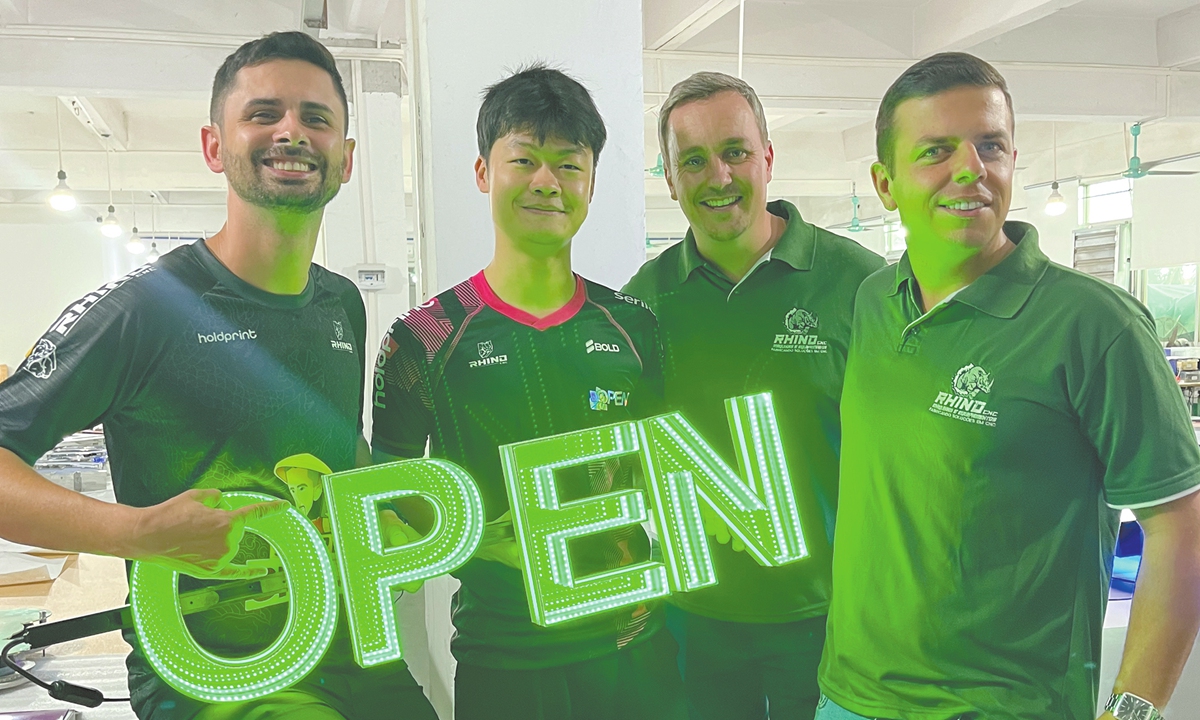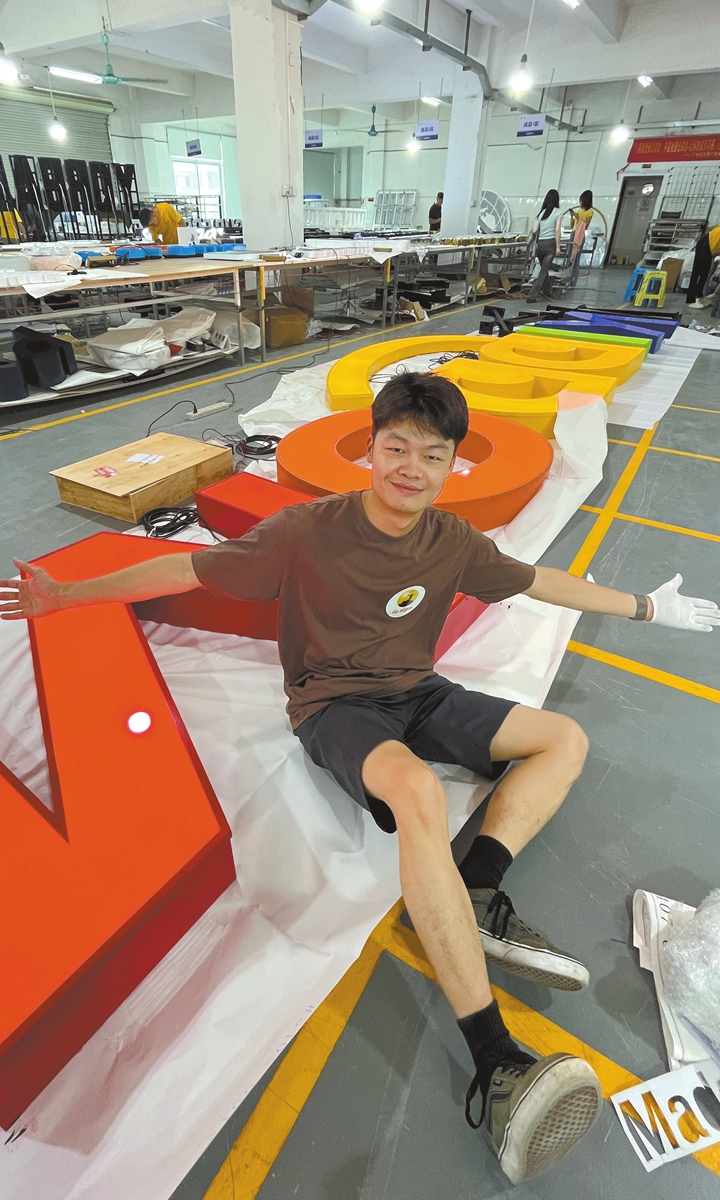
Zhu Yu (second from left) and his team (Photo: Courtesy of Lc Sign)
In a showroom at a commodities market in Guangzhou, South China's Guangdong Province, 26-year-old Zhu Yu (Tony) stands in front of the camera, holding up a transparent panel less than one centimeter thick. With exuberant energy, he declares, "Dude, I'm Tony. This is a tempered glass panel. It can withstand three dudes standing on it. Do you believe it? Watch me!"
The camera cuts to him jumping onto the panel and standing firmly. He continues, "It looks good hanging in the store too. And I can't find any shortcomings with it." His delivery is fast-paced and theatrical, ending with his signature catchphrase: "Check out our bio for more science!"
The 30-second video then went viral on video sharing platform TikTok, racking up millions of views. In the comments, some laugh at his accented English, while others say he is better at sales than the company's own CEO. But most are expressions of affection from viewers around the world for this young Chinese "fellow countryman" shtick.
"In a world full of polished ads and corporate talk, what really connects with potential buyers is honesty wrapped in humor. It breaks down walls faster than any sales pitch ever could," Zhu told the Global Times.
Today, Zhu is the head of social media content at Lc Sign, a signage company with over 3 million followers on social media. With his accented English and theatrical performances, he has turned product demos into "global jokes" - and himself into an unlikely bridge between Chinese manufacturing and overseas audiences.
Stylized sales talk
A few years ago, Zhu was just an ordinary salesperson, spending his days replying to inquiries and adjusting quotes. His English was good, but he wasn't talkative; appearing on camera was something he forced himself to do.
"For the first six months, there was no progress at all," he said. "I even thought I would lose my job."
The real turning point came when he tried imitating a foreign accent for the first time. "I'm a fan of Russell Peters - he mimics how people from different countries speak," he said. "I thought I'd give it a try."
That day, he introduced a product while imitating an Indian client's accent. "People loved it. They commented it was spot on."

Zhu Yu poses in front of a giant LED sign. (Photo: Courtesy of Lc Sign)
The audience's warm response made him realize that this mix of mimicry and self-deprecating humor resonated far more than traditional sales pitches. He began weaving in cultural references and language jokes into his videos, gradually developing his own style.
Some say he "sells with acting skills," others joke that he is "earning foreign exchange with punchlines." Either way, his content has evolved from sales pitches to solid performances - a kind of cross-cultural theater that blends satire, mimicry, and a reversal of the comical role, packed with the kind of social media flair rarely seen in B2B marketing.
"I never set out to be famous, and I'm not doing this for attention," Zhu said. "I'm just a salesman."
But his commitment to "seriously selling products" has unexpectedly become a form of authentic humor. Viewers say he's like "a delivery truck powered by words" - promoting lightboxes while joking about global power shortages, cultural misunderstandings and trade stereotypes.
Zhu believes that the misunderstandings between East and West often come from "a mutual choice of ignorance and remaining uninformed."
"The more you understand, the more you can laugh," Zhu says. "You'll know what's a joke, and what isn't."
Within his company, Zhu's role has also evolved. He's no longer just the guy responding to inquiries, he's become the team's "idea engine" and on-camera lead. As viewership grew, so did the inbound interest from international buyers, steadily boosting orders.
"There was no viral explosion - just slow, steady growth," Zhu says. "But being able to sell in my own way, that's the biggest win."
Looking ahead, he hopes to integrate the supply chain and build a more complete "signage universe."
"This industry has so many product categories, and so many fun stories," he noted. "I want the whole world to understand what the Chinese Sign Business is all about."
Zhu doesn't lecture about cultural confidence - but he offers something more persuasive: A grounded response to the world, using humor as his medium, and manufacturing as his base.
Digital culture bridge
This is not an isolated case - an increasing number of young Chinese internet savants are gaining global popularity through humor, mimicry and skits, employing unorthodox expressions. For instance, Chinese video blogger Lin Yue (Candise) introduces Chinese internet culture, offering a window into Chinese internet humor for global audiences.
According to the Southern Metropolis Daily, Lin shared the story of a netizen named Xiao Ai who sought advice online about her appearance and underwent a transformation based on netizens' suggestions. This "listening to advice" trend captured the attention of global netizens and resonated widely.
The video quickly went viral, amassing nearly 10 million views. Many international netizens mimicked the "listening to advice" trend in the comments section, requesting "Chinese-style makeovers," and referred to it as a "mysterious Eastern power."
Lin's content sparked a wave of cultural curiosity, turning her platform into an unexpected meeting point for Chinese internet humor and global audiences.
"The popularity of these young individuals reflects the ability of Chinese youth to break cultural barriers with creativity and humor," Wang Deyan, a professor at the school of liberal arts and law at the North China University of Technology, told the Global Times on Tuesday.
"Through short videos, a globally universal medium - they convey Chinese manufacturing and culture in a relaxed manner to the world," he said.
"This phenomenon not only showcases the confidence and creativity of Chinese youth in the context of globalization but also provides new avenues for the dissemination of different culture."
















